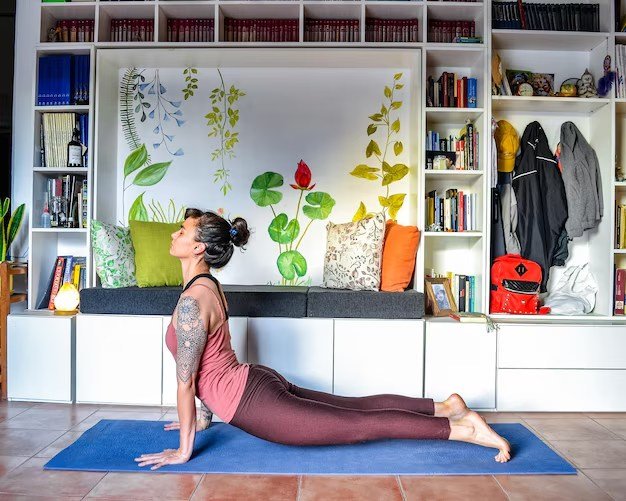How to Set Up a Simple Home Yoga Space on a Budget

Creating a peaceful yoga space at home doesn’t require spending hundreds of dollars or having a spare room. With some planning and creativity, you can build a calming practice area for under $50 that works just as well as expensive studio setups.
Finding the Perfect Space in Your Home
Space Requirements
You don’t need a vast area to practice yoga effectively. The basic space requirements are simpler than most people think:
Minimum space needed:
- Size: About 6–7 feet, giving room for your body and full arm reach.
- Width: 3-4 feet (space for side stretches)
- Height: 8 feet (room for overhead poses)
- Total: About 24 square feet
Location Options Throughout Your Home
| Room | Pros | Cons | Best For |
|---|---|---|---|
| Living Room | Most space, natural light | Family interruptions | Morning practice |
| Bedroom | Private, quiet | Limited space | Evening relaxation |
| Basement | Uninterrupted, cool | Low ceilings, poor lighting | Hot yoga styles |
| Garage | Lots of space | Temperature control issues | Seasonal practice |
| Outdoor Deck | Fresh air, nature sounds | Weather dependent | Fair weather only |
Smart Space-Sharing Tips
Multi-purpose areas work great:
- Roll up your mat after practice
- Use furniture that doubles as storage
- Choose spots that family members use at different times
- Consider outdoor spaces during good weather
Essential Equipment Under $50
Must-Have Items (Total: $35-45)
Yoga Mat ($15-25)
- Look for a 6mm thickness for comfort
- Non-slip texture prevents injuries
- Standard size: 68″ x 24″
- Good budget options: Gaiam, BalanceFrom brands
Storage Solution ($10-15)
- Mesh bag for easy transport
- Under-bed storage box
- Wall hooks for hanging
- Basket that matches your decor
Basic Props ($5-10)
- Towel (you already own this)
- Pillow or cushion for support
- Books as makeshift blocks
- Belt or tie as a yoga strap
Nice-to-Have Additions (Under $25 Each)
| Item | Price Range | DIY Alternative | Purpose |
|---|---|---|---|
| Yoga blocks | $8-15 | Stack of books | Support in poses |
| Bolster | $20-35 | Firm pillow + blanket | Restorative poses |
| Meditation cushion | $15-25 | Folded blanket | Comfortable sitting |
| Essential oil diffuser | $15-30 | Bowl of water + drops | Calming atmosphere |
DIY Equipment Ideas That Work
Homemade Props from Household Items
Yoga blocks alternatives:
- Hardcover books wrapped in towels
- Sturdy shoe boxes filled with clothes
- Paint cans (clean and dry)
- Wooden blocks from craft stores
Bolster substitutes:
- Firm couch pillows
- Rolled-up blankets secured with rubber bands
- Sleeping bag stuffed into a pillowcase
- Pool noodles wrapped in towels
Strap replacements:
- Old ties or belts
- Bathrobe sashes
- Resistance bands
- Long scarves
Creating the Right Atmosphere
Lighting Solutions on a Budget
Natural light is best:
- Practice near windows when possible
- Use sheer curtains to soften harsh sunlight
- Face east for energizing morning light
- Choose west-facing spots for calming evening sessions
Affordable artificial lighting:
- String lights: $5-10 (creates warm ambiance)
- Salt lamps: $15-25 (soft, calming glow)
- Candles: $3-8 (flickering light aids relaxation)
- Floor lamps with dimmer switches: $20-40
Sound and Scent Without Breaking the Bank
Free sound options:
- YouTube yoga playlists
- Nature sounds apps
- Open windows for natural sounds
- Practice in quiet early morning hours
Budget-friendly scents:
- Essential oils: $5-10 per bottle
- Incense sticks: $2-5 per pack
- Fresh flowers from your garden
- Lemon or orange peels
Temperature and Air Quality
Keeping Your Space Comfortable
Temperature control:
- Use fans for hot yoga styles (cost: $15-30)
- Open windows for fresh air circulation
- Practice barefoot for better temperature regulation
- Layer blankets for cooler restorative practices
Air quality improvements:
- Open windows before practice
- Use houseplants as natural air purifiers
- Avoid practicing near cooking smells
- Keep the space clean and dust-free
Storage and Organization Hacks
Maximizing Small Spaces
Vertical storage solutions:
- Wall-mounted hooks for mats
- Over-door organizers for props
- Floating shelves for books and accessories
- Pegboards for hanging equipment
Hidden storage ideas:
- Ottoman with internal storage
- Under-bed storage boxes
- Baskets that double as decor
- Furniture with built-in compartments
Quick Setup and Cleanup Systems
5-minute setup routine:
- Roll out the mat in the designated spot
- Grab props from the storage basket
- Set the phone to airplane mode
- Light a candle or turn on soft music
- Take three deep breaths to begin
3-minute cleanup routine:
- Wipe down the mat with a damp cloth
- Roll mat and return to storage
- Put props back in the basket
- Blow out candles safely
- Open windows for fresh air
Safety Considerations
Important Safety Tips
According to the Centers for Disease Control and Prevention, proper setup prevents yoga-related injuries:
Surface safety:
- Ensure the mat doesn’t slip on smooth floors
- Use yoga towels on hardwood for extra grip
- Check for obstacles around your space
- Maintain clear pathways to avoid tripping
Equipment safety checklist:
- Inspect the mat regularly for wear and tear
- Ensure props can support your weight
- Keep sharp objects away from the practice area
- Have water nearby for hydration
Expert Tips from Certified Instructors
Professional Insights on Home Practice
Yoga Alliance certified instructor Sarah Chen shares: “The most important element isn’t expensive equipment—it’s consistency. A simple, accessible setup that you use daily beats a fancy room that intimidates you.”
Key principles from professionals:
- Start small and add items gradually
- Focus on one element at a time (mat first, then props)
- Prioritize safety over aesthetics
- Make the space inviting, not perfect
Common Beginner Mistakes to Avoid
Setup mistakes:
- Buying everything at once (overwhelming and expensive)
- Choosing spaces that aren’t consistently available
- Focusing on appearance over function
- Skipping the trial period before major purchases
Budget mistakes:
- Comparing your setup to expensive studios
- Buying specialized props before learning the basics
- Ignoring free alternatives that work just as well
- Spending money on items you won’t actually use
Maintenance and Upkeep
Keeping Your Space Fresh
Weekly maintenance (10 minutes):
- Wipe down the mat with a gentle cleaner
- Dust surfaces and wash fabric props
- Check equipment for damage
- Reorganize storage areas
Monthly deep cleaning:
- Vacuum or mop the practice area
- Wash blankets and towels used
- Replace candles or refresh scents
- Evaluate what’s working and what isn’t
References:
- Centers for Disease Control and Prevention: “Physical Activity Guidelines and Injury Prevention”
- Yoga Alliance: “Home Practice Safety Guidelines”
- American Council on Exercise: “Creating Safe Exercise Spaces at Home”
- International Association of Yoga Therapists: “Equipment Safety Standards”
Remember, the best yoga space is one you’ll actually use. Start simple, stay safe, and let your practice grow naturally along with your setup. Your wallet and your well-being will both thank you.
